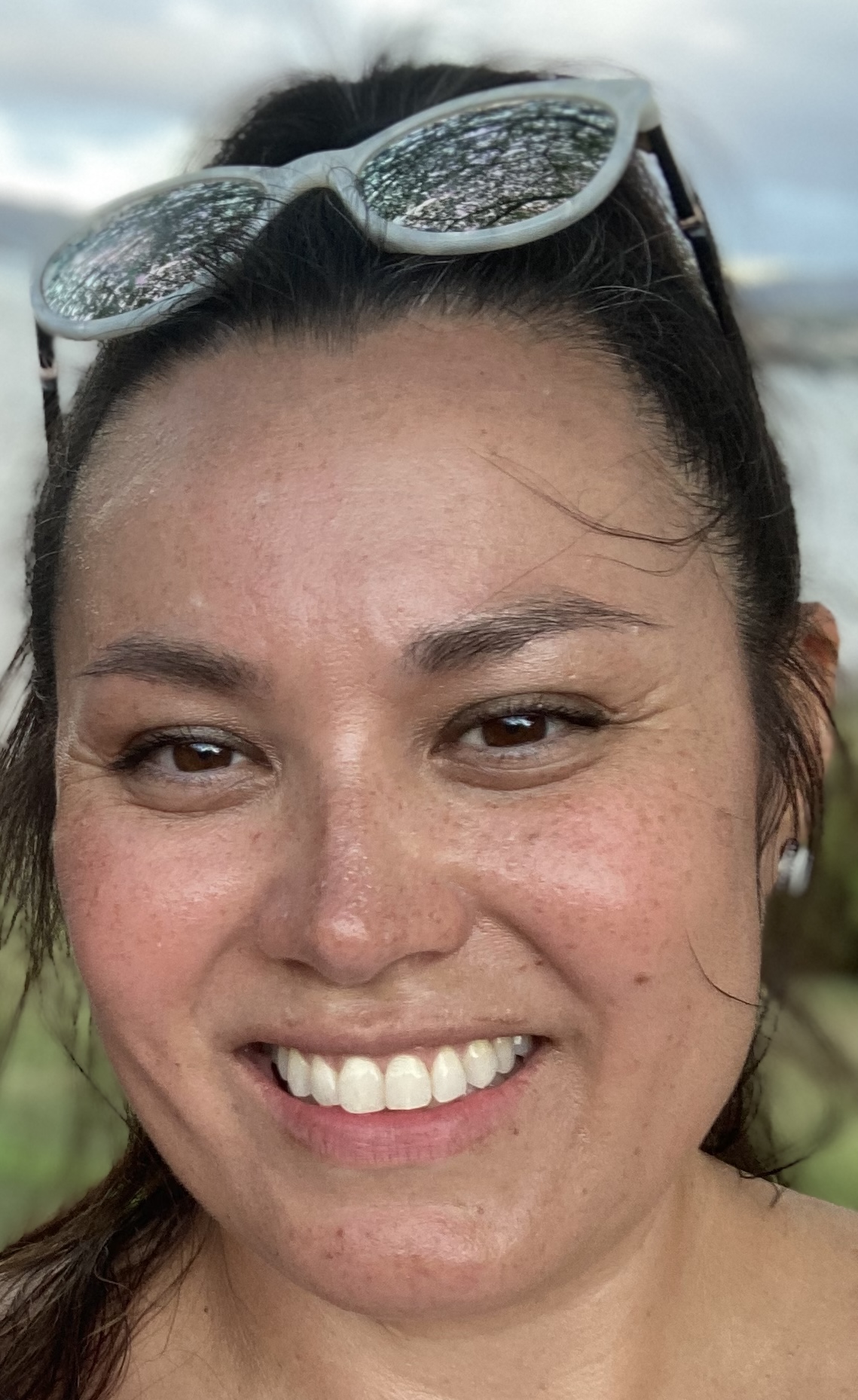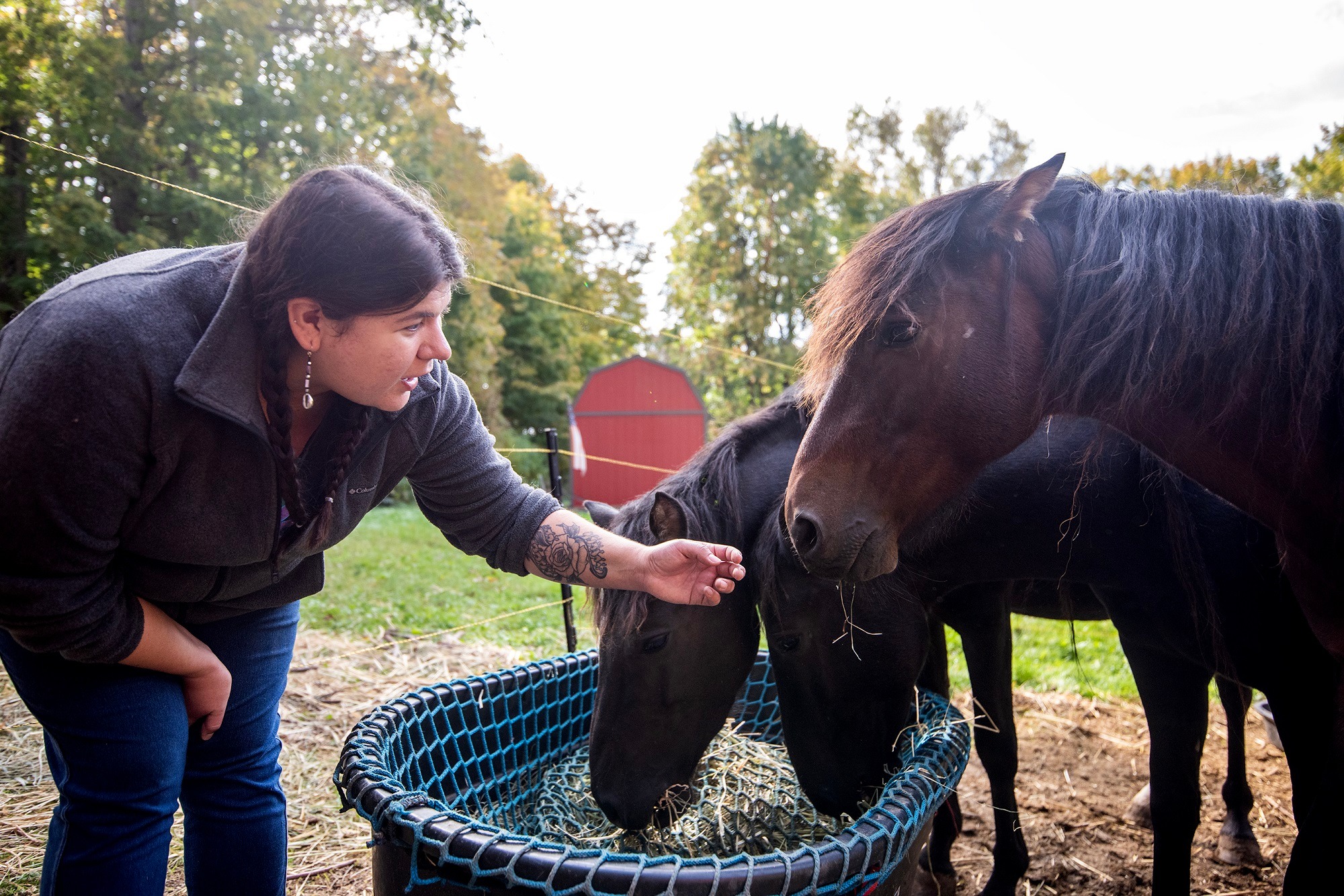Native Nations Nursing, Helpers and Healers Summit
ATTEND IN-PERSON or VIRTUALLY
Join us for the 2023 Native Nations Nursing, Helpers, and Healers Summit to learn about evidence-based approaches and best practices for optimal, culturally congruent health care for Native American people and communities. This year's summit is in conjunction with the Lac Courte Oreille Ojibwe University, College of Menominee Nation, and UW System’s Seven Generations Inter-tribal Leadership Summit, at Lac Courte Oreille Ojibwe University in Hayward, Wisconsin.
We are proud to partner with Lac Courte Oreille Ojibwe University, College of Menominee Nation, and UW System’s Seven Generations Inter-tribal Leadership Summit for this year’s Native Nations Nursing, Helpers & Healers Summit!
The Native Nations Nursing, Helpers & Healers Summit will serve as the pre-convening for the Seven Generations Inter-tribal Leadership Summit on Wednesday, October 11, 2023. There will be additional nursing and health-related sessions during the Seven Generations Inter-tribal Leadership Summit on Thursday & Friday, October 12th & 13th.
Both summits will take place at Lac Courte Oreille Ojibwe University in Hayward, WI.
—Dr. Jeneile Luebke (Bad River Band of Lake Superior Chippewa Tribe), Assistant Professor, UW–Madison School of Nursing
|
Practice Gaps and Needs
Evidence-based approaches addressing health disparities for Native Americans, such as methods and strategies for integrating health care services, are not well known or routinely implemented into current systems. Members of the healthcare team have a unique position and perspective that makes it important for them to be allies and advocates for Native Americans. To be an effective ally, members of the interprofessional team need to know the why, how, and foundations of Tribal community healthcare initiatives.
Only about 10% of the nurses working in Tribal Clinics identify as Native American while nearly 100% of the patients are Native American. Native Americans comprise about 2% of the Wisconsin population while Native American nurses in Wisconsin comprise only about .05% of the nursing workforce. Additionally, a 2018 report found that just one percent of graduates from the University of Wisconsin School of Medicine and Public Health identified as entirely or partially American Indian or Alaska Native over the previous 37 years.
This year's summit focuses on values and ethics for interprofessional healthcare teams and interprofessional communication, and promoting comprehensive, trauma informed, and culturally safe care for all Native Americans. Summit speakers will highlight various aspects of comprehensive care such as equine-based healing, forensic nursing care and maternal child health nursing, and healing through movement.
Elements of Competence
This educational activity is designed to change learner competence and focuses on the following competencies:
- Accreditation Council for Graduate Medical Education (ACGME)/Nursing: Interpersonal and Communication Skills
- National Academy of Medicine (NAM)/Nursing: Provide patient/person-centered care and Population Health
- Interprofessional Education Collaborative Competencies: Values/ethics for interprofessional practice and Interprofessional Communication
- UW ICEP Diversity, Equity, and Inclusion: Engage in Self-reflection, Address Health Disparities, and Value Diversity in the Clinical Encounter.
Intended Audience
The Native Nations Nursing Helpers and Healers Summit is for nurses, advanced practice nurses, physicians, psychologists, social workers, and other healers to come together in collaboration to share knowledge and approaches that address the health and well-being of Indigenous communities.
Learning Objectives
By the end of the summit, participants as members of the healthcare team will be able to:
- Identify best practices to provide culturally congruent care
- Explain current initiatives by Tribal healthcare systems to provide comprehensive and trauma informed care to patients
- Apply principles of holistic and Indigenous healthcare into current public health initiatives
- Discuss how the interprofessional healthcare team can provide culturally congruent and ethical care for Native American populations and communities.
The University of Wisconsin–Madison Interprofessional Continuing Education Partnership (ICEP) gratefully acknowledges the financial support from the following companies/organizations:
University of Wisconsin–Madison, School of Nursing Signe Skott Cooper Continuing Education Fund
Native American Center for Health Professions (NACHP)
University of Wisconsin–Madison, University Health Services
Agenda
Wednesday, October 11, 2023
Time (in CT) | Activities/Topics/Speakers | Learning Objectives |
| 11:00 - 12:00 PM | Registration and Lunch for In Person Attendees ***No credit provided for the Registration and Lunch | |
| 12:00 - 12:30 PM | Welcome/Singers/Prayer ***No credit provided for the Welcome/Singers/Prayer | |
| 12:30 - 1:15 PM | Presentation 1Indigenous Voices ElevatED |
|
| 1:15 - 2:15 PM | KeynoteNindinawemaaganidog: My Relatives |
|
| 2:15 - 2:30 PM | Break | |
| 2:30 - 3:15 PM | Presentation 2Mino-Bimaadiziwin (The Good Life) |
|
| 3:15 - 4:00 PM | Breakout Sessions | |
a. Birth Sovereignty |
| |
b. Advocacy Driven Medical Forensic Care |
| |
| 4:00 - 4:15 PM | Break | |
| 4:15 - 5:15 PM | PodiumEquine-Based Healing & Land-Based Healing |
|
| 5:15 - 6:00 PM | Dinner and Sharing ***No credit provided for the Dinner and Sharing | |
| 6:15 - 6:40 PM | Summary of Key Teachings and Reflections |
|
| 6:45 - 7:30 PM | Talking Circle(s) ***This session is only available for those attending the summit in person. |
|
Friday, October 13, 2023
Time (in CT) | Activities/Topics/Speakers | Learning Objectives |
| 12:30 - 1:15 PM | Healing from Within: |
|
Program Changes
Situations occasionally occur that may necessitate topic or speaker changes. The University of Wisconsin-Madison ICEP reserves the right to alter or substitute a topic or speaker without prior notification.
Travel
There will be blocks held for the nights of October 10th – 12th, 2023 at the following hotels:
- Holiday Inn Express & Suites Hayward
15586 County Road B
Hayward, WI 54843
(715) 634-0700
Ask for UW Madison School of Nursing block
10 Double Queen and 10 King Standard rooms held at the summit rate - $129 per night (total of 20 rooms held)
This room block releases on 08/24/23. Please book before then to ensure you receive the guaranteed rate.
- Seven Winds Casino
13767W County Road B
Hayward, WI 54843
(715) 634-5643
Ask for group #1453 – UW Madison School of Nursing block
20 rooms held at $62.10 per night, with a $100 refundable deposit due at check in
This room block releases on 09/10/23. (I month before the event.)
EMCEE
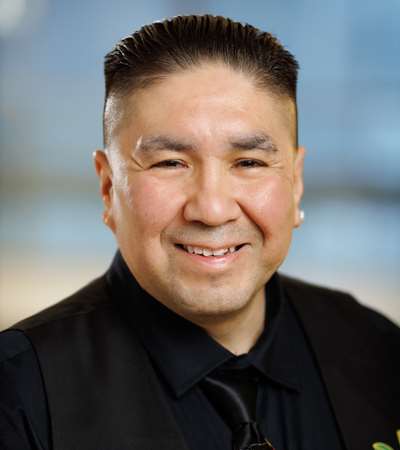 Brian Jackson, MS, EdD (Lac du Flambeau Band of Lake Superior Chippewa) | Brian Jackson, MS, EdD (Lac du Flambeau Band of Lake Superior Chippewa)Dr. Jackson is an assistant professor with a background serving Indian Country with an emphasis on Community Based Participatory Research. He is part of the Great Lakes Native American Research Center for Health (GLNARCH) Community Scientific Advisory Committee serving the Bemidji Area. He has worked extensively with Native American students in student development programs through storytelling and cultural teachings combining academic research and Indigenous ways of being. Furthermore, Dr. Jackson is trained as a Family Circles AODA Prevention Program facilitator; providing instruction in language, traditional cultural practices, history, and culture of Native people will be preserved, thereby restoring pride in the identity of Anishnabe. With an introspective approach in which family members examine their own behaviors, the curriculum enables individuals to better understand how the process of realizing positive healthy lifestyles within the family begins with self-esteem building, coping skills building through Indian culture, values and lifestyles. |
SPEAKERS
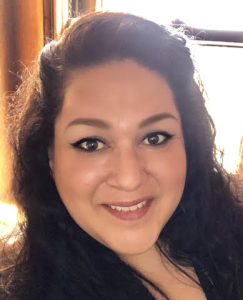 Jennifer Boulley, Certified Doula (Bad River) | Jennifer Boulley, Certified Doula (Bad River)Ms. Boulley is a member of the Bad River Band of Lake Superior Ojibwe and has lived in the Chequamegon Bay area for the majority of her life. She has had a unique career working for the Park Service – Apostle Islands National Lakeshore, volunteering as an AmeriCorps member for several tours off duty, serving as a foster parent, working for the Red Cliff Tribe in community/maternal child health and now working for a municipal government. Jennifer is an Indigenous Birth-worker & Water Protector. She is passionate about helping indigenous communities protect & strengthen their sovereignty. |
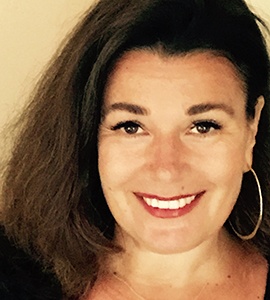 Jacqui Callari-Robinson, BSN, RN, SANE-A, SANE-P, D-F IAFN | Jacqueline Callari-Robinson, BSN, RN, SANE-A, SANE-P, D-F IAFN Jacqueline Callari Robinson is presently the Research Assistant for HRSA SANE Grant and Tracking Our Truth, Department of Justice, FAST Grant, and a Ph.D. Student at The University of Wisconsin Milwaukee. Jacqueline’s clinical practice is a tele safe nurse for the Trinity Health New York, taking call to evaluate sexual assault patients. In 2020, Jacqueline edited the SANE A/P Preparation Manuscript, published by Springer Publishing Company. Her expertise is assessing and providing sexual abuse medical forensic care and training providers and systems to offer patient-centered compassionate care. Her present duties include oversight of the Advocacy Driven Medical Forensic Care to AI communities throughout Wisconsin, training nurses, program development, providing technical assistance, and Medical/Forensic program sustainability. Jacqueline also served as Co-Chair of the IAFN Social Justice Committee, creates statewide protocols and procedures to develop survivor social systems response to sexual assault victims. In 2011 she was awarded the Distinguished Fellow award from The International Association of Forensic Nurses. Jacqueline also provides case consultation and technical assistance; and develops training materials, resources, and publications. |
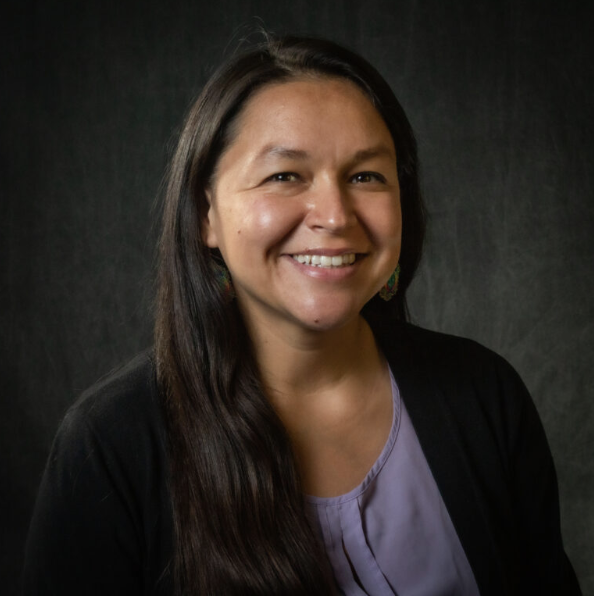 Serena Cisneros, MS (Lac Courte Oreilles) | Serena Cisneros, MS (Lac Courte Oreilles)Serena Cisneros is Anishinaabe from the Lac Courte Oreilles Reservation and acknowledges value in Indigenous ways of healing. Serena’s areas of focus include holistic healing approach, incorporating compassion and acceptance in supporting a person’s wellness. Cisneros has worked in different mental health modalities including residential, outpatient, and community based. Cisneros chose to work in college health care with hopes to support, foster, and empower a student’s academic experience during their formative years. Serena also hopes to create a safe and brave place a student can explore their relationship to their emotional intelligence. Outside of UHS Cisneros finds nourishment in activities in nature, eating delicious food, and finding humor in her day-to-day as laughter is also healing. |
Jill Greendeer, PhD, MA, MS | Jill Greendeer, PhD, MA, MS (Ho-Chunk Nation)As a Hocak hinuk (woman), nani (mother), sister, and relative, Jill's life purpose resides within the space of diversity, equity, and inclusion, and is part of the bridge between Indigenous communities, academia, holistic wellness, cultural traditional healing, and healthcare. Jill's life work and lived experience have prepared her for this role. She has experience working in academic, corporate, and clinical settings both within Native American communities and in mainstream society. She has lived experience as an Indigenous woman in both urban and rural environments that add to her diverse worldview and give her a strong sense of grounded Indigenous voice to pursue her life purpose of helping to heal and empower Indigenous people. Her experiences pursuing a PhD at University of Minnesota School of Nursing as an Indigenous woman allowed her to develop a heightened awareness of systemic racism and oppression. She recognizes systemic racism and oppression are deeply embedded within healthcare and academia. Far too often, she sees non-Indigenous people benefit at Indigenous communities’ expense when they are rewarded as leaders and advocates of diversity and equity. They often publish research articles and misrepresent, misinterpret, and misguide their ‘findings’ within Indigenous communities with adverse impacts on Indigenous communities. This experience gave her life purpose and call to action a deeper sense of need and urgency: the opportunity to stand her ground, speak her truth, share her Indigenous lived experience, and find comfort in uncomfortable spaces, conversations, and initiatives. She understands that we all have tremendous work to do and cannot accomplish this alone. She hopes to continue to network with others who value diverse and Indigenous voices and perspectives. |
| Em Loerzel, PhD, MSW, Founder, The Humble Horse (White Earth Minnesota)Em’s research primarily focuses on MMIW, domestic and sexual violence in Native communities, with an additional special interest in decolonizing research methods to take a more community-based approach, as well as the relationship between the critically endangered Ojibwe horse and their Ojibwe relatives. Em is White Earth Ojibwe and feels strongly about the wellness and future of her community and other Indigenous ones, drawing from her practice background of working with the Chicago urban Indian community. She is also the founder of The Humble Horse, a 501(c)3 dedicated to the education and preservation of the Ojibwe horse and their relationship to the Anishinaabe people. She strives to bring more Indigenous perspectives into research, the classroom, and the thriving of future Indigenous social workers and researchers. |
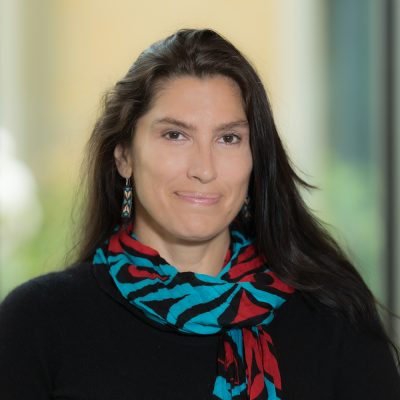 Jeneile Luebke, PhD, RN (Bad River Band of Lake Superior Chippewa) | Jeneile Luebke, PhD, RN (Bad River Band of Lake Superior Chippewa)Jeneile Luebke PhD, RN is an Assistant Professor in the School of Nursing at University of Wisconsin–Madison. She was an Anna Julia Cooper fellow in the School of Nursing in 2020-2022, and a STREAM post-doc fellow in 2020-2021. She holds an affiliate appointment for the American Indian Studies program and a faculty member of the campus Sexual Violence Research Initiative. She is an enrolled member of Bad River Band of Lake Superior Chippewa Indians. She received her BS and MS in Nursing from the University of Wisconsin–Madison, and her PhD at UW–Milwaukee. Her research aims to better understand the lived experiences of gender-based violence, as well as advocating for survivor-led, trauma informed, and culturally safe interventions and options for Indigenous survivors of violence using Indigenous specific and community engaged research methodologies. Her other current work focuses upon the relationship between land violence, planetary health, and gender-based violence among Indigenous peoples. She will be co-teaching N702: Health Promotion and Disease Prevention this fall, and N510 Culturally Congruent Practice in spring 2023. |
![Misty L. Wilkie, PhD, RN, FAAN [she/her] (Turtle Mountain Band of Chippewa/Métis)](https://ce.icep.wisc.edu/sites/default/files/media/2023-08/Wilkie2.jpg) Misty L. Wilkie, PhD, RN, FAAN [she/her] (Turtle Mountain Band of Chippewa/Métis) | Misty L. Wilkie, PhD, RN, FAAN [she/her] (Turtle Mountain Band of Chippewa/Métis)Dr. Wilkie is a clinical associate professor, Director & Mentor for the Pathway to Doctoral Education for AI/AN Nurses grant, and Assistant Director of Inclusivity, Diversity & Equity (IDE) at the University of Minnesota School of Nursing (UMN SON). Her research and clinical interests include supporting minority nursing students with a focus on those from American Indian/Alaska Native/Indigenous backgrounds to improve health outcomes for the individuals and their communities. Prior to her appointment at the UMN SON, Dr. Wilkie was a Professor at Bemidji State University. During her tenure at BSU, in 2017, she was the first in Minnesota to receive a HRSA Nursing Workforce Diversity grant and was the Founder/Director of Niganawenimaanaanig (Ojibwemowin for ‘we take care of them’) securing $4.2 million in federal funding to recruit, retain, graduate, and license American Indian/Alaska Native/Indigenous baccalaureate prepared nurses. She has served on several national diversity, equity, and inclusivity committees and is internationally recognized for her work to support minority nursing students. In collaboration with Shadow Health/Elsevier, Inc., she helped develop the first American Indian simulation for a digital clinical experience to provide nursing students across the country with an opportunity to provide culturally sensitive care to a unique Indigenous patient. |
Planning Committee
Jeneile Luebke, PhD*, Assistant Professor, UW-Madison School of Nursing | Amy DeLong, MD, MPH Family health and adolescent health specialist, Ho-Chunk Nation House of Wellness Clinic, Baraboo, Wisconsin | Melissa Metoxen, MS, Assistant Director, UW-Madison School of Medicine and Public Health, Native American Center for Health Professions | Kate Walsh, PhD, Licensed Clinical Psychologist |
John Breuninger, RN, Community Member | Laura Hiebing, MSW, Indigenous Student Services Coordinator, UW-Madison Academic Coaching and Tutoring Services | Amy Poupart, Program Director, Native American Research Center for Health, Great Lakes Inter-Tribal Council, Inc. | Danielle Yancey, Director, UW-Madison School of Medicine and Public Health, Native American Center for Health Professions |
Serena Cisneros, MS, Mental Health Provider, UW-Madison University Health Services | Lina Martin, Advocate for Uplifting Native Traditions and Indigenous Engagement, UW-Madison School of Medicine and Public Health, Native American Center for Health Professions | Joanne Schedler, RN, Community Member | |
Janet Dawson, Executive Assistant for Faculty Affairs & Associate Deans, UW-Madison School of Nursing | Jessica Melnik, Student Research Assistant, UW-Madison School of Nursing | Audrey Tluczek, PhD, Retired Professor, Former STREAM Program Director, UW-Madison School of Nursing |
*Summit Chair
Policy on Disclosure
It is the policy of the University of Wisconsin–Madison Interprofessional Continuing Education Partnership (ICEP) to identify, mitigate and disclose all relevant financial relationships with ineligible companies** held by the speakers/presenters, authors, planners, and other persons who may influence content of this accredited continuing education (CE). In addition, speakers, presenters and authors must disclose any planned discussion of unlabeled/unapproved uses of drugs or devices during their presentation.
For this accredited continuing education activity all relevant financial relationships have been mitigated and detailed disclosures are listed below.
| Name | Role | Financial Relationship Disclosures | Discussion of Unlabeled/ Unapproved uses of drugs/ devices in presentation? | |
| Jeneile Luebke, PhD, RN (Bad River Band of Lake Superior Chippewa) | Director, Speaker | No relevant relationships with ineligible companies to disclose | No | |
| Nina Berge, BA, Nursing Professional Development Continuing Education Specialist | Committee Member | No relevant relationships with ineligible companies to disclose | No | |
| Jennifer Boulley, Certified Doula (Bad River) | Speaker | No relevant relationships with ineligible companies to disclose | No | |
| John Breuninger, RN, Community Member | Planner, Facilitator | No relevant relationships with ineligible companies to disclose | No | |
| Jacqui Callari-Robinson | Speaker | No relevant relationships with ineligible companies to disclose | No | |
| Serena Cisneros, MS (Lac Courte Oreilles) | Planner, Speaker | No relevant relationships with ineligible companies to disclose | No | |
| Janet Dawson, Executive Assistant for Faculty Affairs & Associate Deans, UW-Madison School of Nursing | Planner | No relevant relationships with ineligible companies to disclose | No | |
| Sue Gaard, MS, Nursing Professional Development Director | Committee Member | No relevant relationships with ineligible companies to disclose | No | |
| Jill Greendeer, PhD, MA, MS (Ho-Chunk Nation) | Speaker | No relevant relationships with ineligible companies to disclose | No | |
| Emily Haarsma, Nursing Professional Development Continuing Education Specialist | Committee Member | No relevant relationships with ineligible companies to disclose | No | |
| Laura Hiebing, MSW, Indigenous Student Services Coordinator, UW-Madison Academic Coaching and Tutoring Services | Planner | No relevant relationships with ineligible companies to disclose | No | |
| CJ Figgins Hunter, Community Member | Committee Member | No relevant relationships with ineligible companies to disclose | No | |
| Brian Jackson, MS, EdD (Lac du Flambeau Band of Lake Superior Chippewa) | Emcee | No relevant relationships with ineligible companies to disclose | No | |
| Amy DeLong, MD (Ho-Chunk Nation) | Planner | No relevant relationships with ineligible companies to disclose | No | |
| Lina Martin, Advocate for Uplifting Native Traditions and Indigenous Engagement, UW-Madison School of Medicine and Public Health, Native American Center for Health Professions | Planner | No relevant relationships with ineligible companies to disclose | No | |
| Melissa Metoxen, MS, Assistant Director, UW-Madison School of Medicine and Public Health, Native American Center for Health Professions | Planner | No relevant relationships with ineligible companies to disclose | No | |
| Tracy Mrochek, MPA, RN, NPD-BC, Nursing Professional Development Manager | Committee Member | No relevant relationships with ineligible companies to disclose | No | |
| Em Loerzel, PhD, MSW, Founder, The Humble Horse (White Earth Minnesota) | Speaker | No relevant relationships with ineligible companies to disclose | No | |
| Rob Poehnelt, Nursing Professional Development Continuing Education Specialist | Committee Member | No relevant relationships with ineligible companies to disclose | No | |
| Amy Poupart, Program Director, Native American Research Center for Health, Great Lakes Inter-Tribal Council, Inc. | Planner | No relevant relationships with ineligible companies to disclose | No | |
| Joanne Schedler, RN, Community Member | Planner | No relevant relationships with ineligible companies to disclose | No | |
| Audrey Tluczek, PhD, Retired Professor, Former STREAM Program Director, UW-Madison School of Nursing | Planner | No relevant relationships with ineligible companies to disclose | No | |
| Kate Walsh, PhD, Licensed Clinical Psychologist | Planner | No relevant relationships with ineligible companies to disclose | No | |
| Misty L. Wilkie, PhD, RN, FAAN [she/her] (Turtle Mountain Band of Chippewa/Métis) | Speaker | No relevant relationships with ineligible companies to disclose | No | |
| Danielle Yancey, Director, UW-Madison School of Medicine and Public Health, Native American Center for Health Professions | Planner | No relevant relationships with ineligible companies to disclose | No | |
| Jessica Melnik, Student Research Assistant, UW-Madison School of Nursing | Planner | No relevant relationships with ineligible companies to disclose | No | |
**Ineligible companies are those whose primary business is producing, marketing, selling, re-selling, or distributing healthcare products used by or on, patients. The ACCME does not consider providers of clinical services directly to patients to be ineligible companies.
The University of Wisconsin provides equal opportunities in employment and programming, including Title IX requirements. The University of Wisconsin fully complies with the legal requirements of the ADA and the rules and regulations thereof. If any participant in this educational activity is in need of accommodations, please contact [email protected].
Accreditation Statement
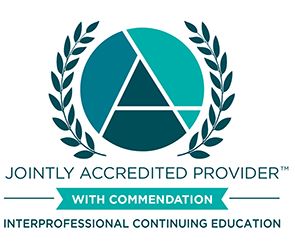 | In support of improving patient care, the University of Wisconsin–Madison ICEP is jointly accredited by the Accreditation Council for Continuing Medical Education (ACCME), the Accreditation Council for Pharmacy Education (ACPE), and the American Nurses Credentialing Center (ANCC) to provide continuing education for the healthcare team. |
Credit Designation Statements
American Medical Association (AMA)
The University of Wisconsin–Madison ICEP designates this live activity for a maximum of 6.5 AMA PRA Category 1 Credit™. Physicians should claim only the credit commensurate with the extent of their participation in the activity.
American Nurses Credentialing Center (ANCC)
The University of Wisconsin–Madison ICEP designates this live activity for a maximum of 6.5 ANCC contact hours.
ASWB Approved Continuing Education (ACE) – Social Work Credit
As a Jointly Accredited Organization, the University of Wisconsin–Madison ICEP is approved to offer social work continuing education by the Association of Social Work Boards (ASWB) Approved Continuing Education (ACE) program. Organizations, not individual courses, are approved under this program. Regulatory boards are the final authority on courses accepted for continuing education credit. Social workers completing this course receive 6.5 general continuing education credits.
American Psychological Association (APA)
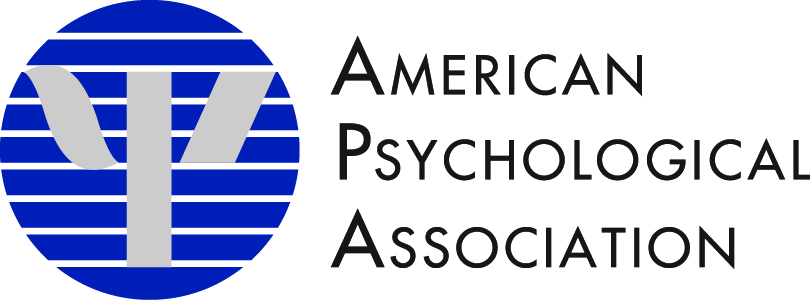 | Continuing Education (CE) credits for psychologists are provided through the co-sponsorship of the American Psychological Association (APA) Office of Continuing Education in Psychology (CEP). The APA CEP Office maintains responsibility for the content of the programs. |
Continuing Education Units (CEUs)
The University of Wisconsin–Madison ICEP, as a member of the University Professional & Continuing Education Association (UPCEA), authorizes this program for .65 CEUs or 6.5 hours.
Available Credit
- 6.50 AMA PRA Category 1 Credit™
- 6.50 ANCC Contact Hours
- 6.50 APA CE Credits
- 6.50 University of Wisconsin–Madison Continuing Education Hours
- 6.50 Approved for AMA PRA Category 1 Credit™
Please pay as you can by selecting the amount that you feel comfortable paying!
If you are not able to pay any of the above, please contact Janet Dawson at [email protected].
Registration for this activity can only be completed through the ICEP Learning Portal. Attendee registrations made through any other sites cannot be honored. UW-Madison ICEP is not able to refund fees paid through unaffiliated registration sites, such as eMedEvents.com, MedConfWorld.com, EventEgg.com, and 10times.com. Please report any unauthorized websites or solicitations for registrations to [email protected].
Accessibility
The University of Wisconsin provides equal opportunities in employment and programming, including Title IX requirements. The University of Wisconsin fully complies with the legal requirements of the ADA and the rules and regulations thereof. If any participant in this educational activity is in need of accommodations, please contact [email protected].
Cancellation and Refund Policy
Requests for cancellation must be submitted in writing to [email protected]. Cancellation requests received at least 96 hours prior to the conference will allow a full refund except for the nonrefundable processing fee of $10 (if applicable). No refunds will be made for cancellations received less than 96 hours prior to the activity start date.
Required Hardware/software
Free, current version of Adobe Acrobat Reader or other .pdf reader.

 Facebook
Facebook X
X LinkedIn
LinkedIn Forward
Forward